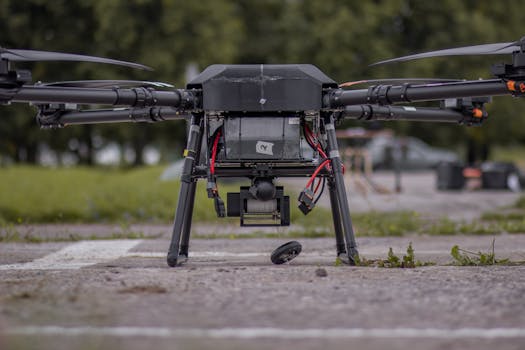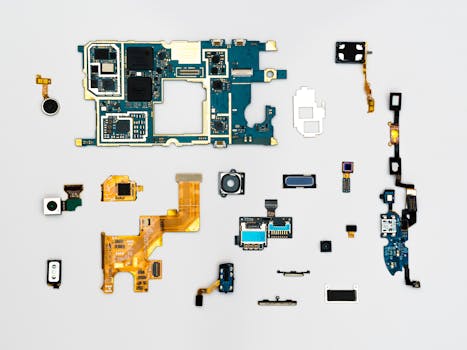You can do a foundation degree or higher national diploma in electrical and electronic engineering.
Entry requirements
You'll usually need:
- 1 or 2 A levels, or equivalent, for a foundation degree or higher national diploma
A Robotics Technician is like a doctor for robots! They are responsible for making sure robots are working properly, fixing them when they break, and helping to set them up for different tasks. This could involve anything from robots in car factories that put cars together, to robots in hospitals that help with operations. You'd be spending your time installing new robots, doing regular checks to make sure they're running smoothly, and troubleshooting any problems. It's a hands-on job where you get to work with cool technology every day, making sure the robots are doing their jobs safely and efficiently. You'll need to be good at solving puzzles and enjoy learning how things work.

A starting salary for a Robotics Technician in the UK is typically around 20,000 to 25,000 pounds per year, but this can go up with experience.
With more experience, a skilled Robotics Technician could earn between 30,000 to 45,000 pounds annually, or even more in senior roles.
The field of robotics is growing rapidly in the UK, meaning there are more and more opportunities for people with these skills. It's a really exciting area to get into!

Imagine you're like a doctor for robots! You'd be the person who checks over robots, fixes them when they're broken, and makes sure they're always working perfectly in factories or even in fun places like theme parks.

This is a bit like teaching a robot what to do! You'd help experienced programmers write the instructions and code that tell robots how to move, pick things up, or even draw pictures. It's about making robots smart!

Think of flying cool gadgets! You'd learn how to control drones for different jobs, like taking amazing aerial photos, inspecting buildings, or even helping deliver small packages. You'd also help keep the drones in good working order.
Start looking at everyday machines and gadgets and think about how they operate. What makes them move? How do they get power?
When you're 13, it's a great time to start being curious! Take apart old broken toys (with an adult's permission, of course!) or try to understand how your remote control car moves. Watch videos online about simple machines or how a robot arm works. This helps you develop a 'mechanical mind' and an interest in engineering.
Pay attention in your Science, Technology, Engineering, and Maths (STEM) classes. These subjects are the building blocks for a career in robotics.
Focus on understanding concepts in physics (like forces and motion), maths (for calculations), and design technology (for building and creating). If your school offers it, try to get involved in any robotics clubs or after-school activities related to technology. The more you learn now, the easier future studies will be.
Try hands-on projects like building small robots from kits or experimenting with basic electronics. This helps you understand circuits and programming.
You can find lots of beginner-friendly robotics kits online or in hobby shops, like those using Arduino or Raspberry Pi. These kits often come with instructions and simple programming challenges. It's a fun way to learn about wiring, sensors, motors, and how to give robots commands. Don't worry if it doesn't work perfectly the first time – troubleshooting is a big part of the job!
When you choose your GCSE subjects, pick those that will give you a strong foundation for further study in engineering and technology.
Good GCSE choices would typically include Maths, Science (especially Physics or Combined Science), and Design & Technology or Computer Science. These subjects will provide you with essential knowledge and skills that are highly valued in robotics and engineering fields. Aim for good grades as they will open up more options for your next steps.
After GCSEs, you'll need to decide between A-Levels or a vocational course to specialise further in engineering or electronics.
For A-Levels, subjects like Maths, Physics, and Further Maths or Computer Science are excellent choices if you're thinking about university. Alternatively, a vocational qualification like a BTEC Level 3 in Engineering or Electrical/Electronic Engineering can provide a more practical, hands-on route directly into employment or further study. Both pathways are valid, so choose the one that suits your learning style best.
After your A-Levels or vocational course, you can either apply for an apprenticeship or go to university to study an engineering-related degree.
An apprenticeship allows you to learn on the job, earning a salary while working towards a qualification (like a Higher National Diploma or a degree apprenticeship). This is a fantastic practical route. If you prefer a university education, a degree in Robotics Engineering, Electrical Engineering, Mechatronics, or Automation would be highly relevant. Both routes will equip you with the advanced skills and knowledge needed to become a Robotics Technician.
Look for internships, work experience placements, or entry-level positions to get hands-on experience in a robotics or manufacturing environment.
Practical experience is incredibly valuable. Many companies offer internships or placements for students and recent graduates. This allows you to apply what you've learned in a real-world setting, understand industry practices, and network with professionals. Even if it's unpaid for a short period, the experience will significantly boost your CV and help you secure a full-time role.
Once you have the right qualifications and some experience, start applying for roles as a Robotics Technician or similar positions.
Look for job openings with manufacturing companies, automation solution providers, research and development firms, or even in sectors like healthcare or logistics that are increasingly using robots. Tailor your CV and cover letter to highlight your relevant skills in electronics, mechanics, programming, and problem-solving. Be prepared for interviews that might include practical tasks or technical questions.
The field of robotics is always changing, so it's important to keep learning new technologies and skills throughout your career.
Robots are constantly evolving, with new programming languages, sensors, and AI capabilities emerging regularly. Attend workshops, take online courses, read industry journals, and participate in professional development programmes to stay up-to-date. This commitment to lifelong learning will ensure you remain a valuable and skilled Robotics Technician throughout your career, opening doors to specialisation or even senior roles.
Explore relevant apprenticeships that can help you kickstart your career in Robotics Technician. Apprenticeships offer hands-on experience and training while earning a wage.
This page showcases various career options and the pathways to reach them. Each career listed here shares transferable skills and knowledge, making it easier for individuals to transition between them.
Your current career is highlighted to help you see how it fits into the broader landscape of potential career choices. By clicking on any career, you can learn more about it, including the training and education required to pursue it.
Remember, progressing in your career often involves further learning and training. This page provides insights into future career options as well as those that can lead up to your current one.
These career progression decisions are informed by comparing the skills and knowledge needed for different occupations, along with data on how people move between them. Explore the possibilities and discover the exciting journey ahead in your career!
A robotics technician largely works with electronic control systems, sensors and actuators, and must diagnose faults, assemble and maintain automation hardware. These tasks and the underpinning knowledge of circuits, instrumentation and test equipment align closely with the qualifications of an electronics engineering technician.
You can get into this job through:
You can do a foundation degree or higher national diploma in electrical and electronic engineering.
You'll usually need:
You could take a college course, which would teach you some of the skills needed for this job.
Relevant courses include:
You'll usually need:
4 or 5 GCSEs at grades 9 to 4 (A* to C), or equivalent, including English and maths for a T Level
You can apply for a place on an apprenticeship to start as a trainee, for example:
You might do a Mechatronics Maintenance Technician Level 3 Advanced Apprenticeship, if you want to work in the service and repair of production line machinery or robotics.
You can also train to be an electronics technician in the Army.
You can apply for a foundation apprenticeship if you're aged 16 to 21.
If you're aged 22 to 24, you can apply if you:
You'll usually need:
You can find out more about courses and careers in engineering from Tomorrow's Engineers and The Institution of Engineering and Technology.
Explore other careers or use our AI to discover personalised paths based on your interests.
Address
Developing Experts Limited
Exchange Street Buildings
35-37 Exchange Street
Norwich
NR2 1DP
UK
Phone
01603 273515
Email
[email protected]
Copyright 2026 Developing Experts, All rights reserved.
Unlock expert-designed lessons, resources, and assessments tailored for educators. No credit card required.
Claim Your Free Trial →